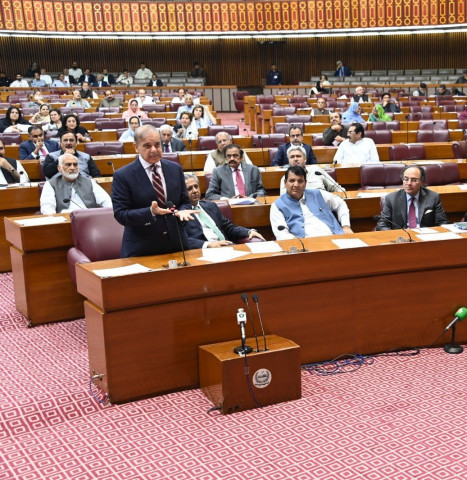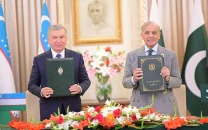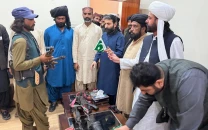PM Shehbaz acknowledges IMF input in Budget 2024-25
Shehbaz Sharif promises tangible outcomes from govt's cost-cutting efforts soon, announces abolishment of PWD

Prime Minister Shehbaz Sharif acknowledged during his address to the National Assembly on Tuesday that the federal government collaborated with the International Monetary Fund (IMF) in formulating the annual budget for the Fiscal Year 2024-25.
He highlighted that the government's decision to work with the IMF was driven by necessity, emphasizing the challenges faced in meeting the budgetary requirements.
The federal budget, amounting to Rs18.87 billion, was presented on June 12 with an ambitious tax revenue target of Rs13 trillion for the upcoming fiscal year, aimed at strengthening the case for a potential new bailout agreement with the IMF.
Pakistan is currently engaged in discussions with the IMF to secure a loan ranging between $6 billion to $8 billion, seeking to prevent an economic default in a region experiencing notably sluggish growth rates.
PM Shehbaz assured the National Assembly that the treasury would promptly update them on the IMF's response, expressing optimism for a positive outcome.
He further outlined his government's efforts to curb expenditures and combat corruption. During the session, he announced the abolishment of the Pakistan Public Works Department, citing pervasive corruption within its development budget.
He disclosed the formation of a rightsizing committee, led by Finance Minister Muhammad Aurangzeb, tasked with streamlining government operations and delivering substantial outcomes by the specified timeline.
Emphasising his administration's commitment to regional development, the premier underscored initiatives aimed at uplifting southern Punjab.
He noted that the PML-N-led government has consistently allocated budgets and employment opportunities exceeding the region's population ratio.
Read: Cabinet decides not to impose new duty on solar panels
PM Shehbaz stated that specific measures included a 10% increase in allocation for southern Punjab under national schemes such as the laptop distribution and PM Rozgar schemes.
He added that the Zevar Taleem Programme saw a significant rise in stipends for female students, from Rs200 to Rs1000.
Furthermore, the PM highlighted federal investments in major infrastructure projects across southern Punjab, including the Lodhran-Khanewal Motorway and the Dera Ghazi Khan-Muzaffargarh Motorway.
Responding to opposition concerns, he highlighted the imminent results of these initiatives, expected to manifest within approximately six weeks.
The PM's address comes amid heightened scrutiny over government spending and efforts to enhance transparency and efficiency in public administration.
NA members discuss economic development, tax reforms, and infrastructure
Addressing the Senate's recommendations on the Budget 2024-25, Mohammad Ilyas Choudhary of the Pakistan Muslim League-Nawaz (PML-N) emphasised the potential to boost foreign remittances by offering enhanced facilities and incentives to overseas Pakistanis, suggesting this could alleviate the country's economic challenges.
Ali Khan Jadoon of the Sunni Ittehad Council (SIC) called for reductions in taxes for the business community, highlighting the industrial sector's current precarious conditions. He noted global practices where imports often enjoy tax exemptions, contrasting with China's rebates for importers. Jadoon cautioned against taxing agricultural machinery, citing potential negative impacts on crop production.
Rana Muhammad Faraz Noon, also from the SIC, voiced support for initiatives like the Sukkur-Hyderabad Motorway and a recycling plant for sacred papers while advocating for tax exemptions on children's milk.
Mohammad Usman Badini of the Jamiat Ulema-e-Islam-Pakistan (JUI-P) expressed concern over delayed Liquefied Petroleum Gas (LPG) plant constructions in Balochistan, urging improvements in the coal mining sector.
Dawar Khan Kundi, another member of the SIC, highlighted the impact of the war on terror in South Waziristan, urging financial assistance for locals affected by landmines.
Also read: Govt focused on lowering inflation and supporting industries: FM Aurangzeb
Umair Khan Niazi, from the SIC, stressed the need for merit-based appointments in the government sector, advocating for improved services at Mother and Child Hospitals to combat rising child fatality rates. He called for strategic policies on water reservoirs, solar energy, and agriculture.
Mehboob Shah, also from the SIC, requested a ten-year tax exemption for businesses in Dir, Malakand Division, and the erstwhile Federally Administered Tribal Areas (FATA), citing their historical challenges due to conflict.
Zubair Khan of the SIC urged thorough investigations into the presence of terrorist elements despite border fencing.
Shabbir Ali Qureshi of the SIC appealed for increased funding to develop South Punjab and restore Kot Addu's district status, citing the lack of higher education institutions in the region. He supported the COMSATS University project for timely completion.
Awais Haider Jakhar of the SIC emphasised the importance of gender equality for economic growth, calling for improved infrastructure in Layyah, including electricity, gas, and a dedicated heart disease hospital.
The discussions underscored diverse concerns and proposals aimed at addressing pressing national issues across various sectors.



















COMMENTS
Comments are moderated and generally will be posted if they are on-topic and not abusive.
For more information, please see our Comments FAQ